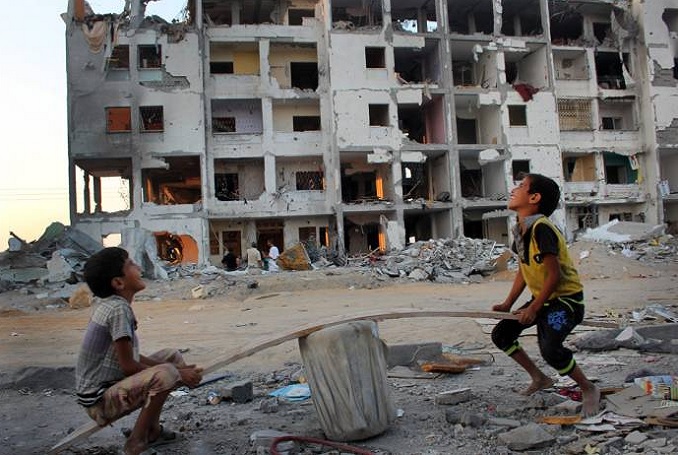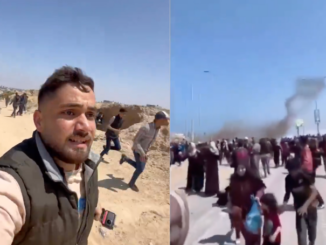
By Break the Maritime Blockade of Gaza
Gaza is the largest open air prison in the world, with 2 million people, mostly children. Now it is lacking potable water, with only 2-4 hours of electricity per day. There is severe widespread physical and psychological trauma and illnesses from numerous Israeli bomb attacks and ground invasions. These have killed thousands and left hundreds of thousands homeless, with widespread infrastructure destroyed. Gaza is suffocating. The UN has predicted that Gaza will become uninhabitable within the next 2 years.
Background
In 1967, Israel invaded and occupied the Gaza Strip. The people of Gaza have suffered under a maritime siege ever since. This blockade is inhumane and illegal. It amounts to collective persecution.
Unlike any other seafaring people in the world, Gaza’s Palestinians have been unable to use their ports to conduct any international commerce for over 50 years — since the 1967 Six Day War. Ships from the Gaza Strip are prevented from leaving Gaza territorial waters, and international cargo is prevented from sailing directly into Gaza. Israel illegally blocks food, medicine, fuel, repair equipment, and other materials to and from Gaza. All goods intended for Gaza must go through Israeli ports, and Israel completely controls what is allowed in and out of Gaza. For the last 11 years, this siege has become extremely severe.
Despite international standards of 20 nautical miles, Gaza fishing vessels are limited to 3-6 nautical miles, depending on the whims of the occupier. Fishers often suffer violent attacks by Israeli warships. They have been injured and killed, and many Gazan fishing vessels have been confiscated, damaged and destroyed.
An international civil society group, the Free Gaza Movement, breached this maritime siege by successfully sailing into Gaza five times in 2008. Ever since, attempts to sail additional boats into Gaza by the Free Gaza Movement, and subsequently the Freedom Flotilla Coalition, have been stopped by violent Israeli piracy in international waters. Activists have been injured and killed, thrown into Israeli prisons, and deported. Boats and ships have been hijacked and confiscated by Israel. In 2014, “Gaza’s Ark,” an international initiative to build a cargo ship in Gaza to sail Gaza merchandise to international markets was crushed when Israeli warplanes completely destroyed the reconstructed ship in Gaza Harbor just before the boat’s renovation was complete. To date, the international community has been unwilling to take any substantial action that could give Gaza the right to maritime commerce like all other countries in the world.
For decades, the U.S. has consistently blocked resolutions at the UN that are critical of Israel. Since the UN Security Council is hopelessly deadlocked with inevitable U.S. vetoes, and since acts of Israeli piracy toward international vessels attempting to reach Gaza occur without consequence, it is time to take the next logical step: A UN General Assembly Intervention Plan (GAIP) toward ending the maritime siege of Gaza.
A Solution
Several groups are now proposing General Assembly action under the “Uniting For Peace Doctrine” to permanently and nonviolently end the Israeli maritime blockade against Gaza. U.S. vetoes have prevented the Security Council from solving the decades-long Israeli occupation and oppression of the Palestinians. The international community cannot continue to simply stand by and allow the suffering of the Palestinians to continue, especially in Gaza, where the abuse is so clear and so preventable. The General Assembly can implement this General Assembly Intervention Plan, a flotilla of state-sponsored cargo ships to carry humanitarian supplies to Gaza free of any Israeli interference. The G.A. can also require that the Israeli blockade end under threat of serious sanctions.
The blockade is a clear “breach of the peace.” The Israeli maritime blockade of Gaza is seen by most international experts as illegal. Ironically and to the point, Israel itself identified the creation of a maritime blockade by Egypt in 1967 as being illegal and a casus belli (an act of war). The United States backed that Israeli position in 1967 asserting that uninvolved nations could break an illegal blockade between A and B, and the U.S. President, Lyndon Johnson, proposed such a flotilla of military ships to break what he understood to be an illegal Egyptian maritime blockade of an important Israeli port.
The Uniting for Peace Doctrine states:
“Conscious that (the) failure of the Security Council to discharge its responsibilities where there appears to be a … breach of the peace … does not relieve Member States of their obligations or the United Nations of its responsibility under the Charter to maintain international peace and security, … (The General Assembly states that) in any cases where the Security Council … fails to act as required to maintain international peace …, the General Assembly …. shall … (step in and make) appropriate recommendations to Members for collective measures (of any kind) … to maintain or restore international peace and security.”
This General Assembly action would not be vulnerable to any Security Council veto, because it will not need American approval. This blockade is an issue that can be completely solved by the General Assembly without force or violence. Furthermore, such action would stipulate that the Israeli maritime blockade ends under threat of serious sanctions. It is time to take concrete substantial support for the Palestinians, in particular, for the people of Gaza.
Moving Forward
A group of activists from the U.S. and Sweden went to the United Nations for a week this past November, coinciding with the International Day of Solidarity with the Palestinian People. Our intention was to bring attention to this General Assembly Intervention Plan for Gaza, gain support, and generate discussion among a number of missions.
While at the UN, along with our allied organizations, we had meetings with officials from the Palestine Mission to the UN and 12 other nations.
Riyad Mansour, the Ambassador for the Palestine Mission to the UN, met with us and gave his blessings. Although he was not able to fully endorse this initiative based on a first meeting, he assured us that he would not oppose it. We also paid visits to several other UN Missions and distributed the 11-page General Assembly Intervention Plan for Breaking the Maritime Blockade of Gaza.
We also were able to make contact with Ambassador Fode Seck of Senegal, who chairs the CEIRPP, Committee on the Exercise of the Inalienable Rights of the Palestinian People. On Wednesday, November 29, 2017, we attended the UN sessions of the International Day of Solidarity with the Palestinian People. At the evening reception, we had informal discussions with other mission representatives and members of civil society supporting Palestinian rights.
In summary, the General Assembly Intervention plan is the next logical step, following the giant footsteps of the Free Gaza Movement and the Freedom Flotilla Coalition. Its goal is to permanently end the 50 year old maritime siege of Gaza. The GAIP is gaining a growing list of endorsers, which include, but are not limited to:
Richard Falk, Rima Khalaf, Hans von Sponeck, Denis Halliday, Miko Peled, Mazin Qumsiyeh, Ramzy Baroud, Rashid Khalidi, Freedom Flotilla Coalition, BDS South Africa and the Rachel Corrie Foundation.
– If you would like to see the full General Assembly Intervention Plan and/or endorse our initiative and/or help move this process forward, please contact us at BreakMaritimeBlockade@gmail.com








PALESTINE FOR EVER.
The only hope for anything resembling a peaceful solution is for the World through the United Nations to insist, by force if necessary, that the Jewish People be removed from the Palestinian State allotted area, and allow the Palestinians to occupy their birthright, even as it is so thoroughly diluted. Legitimacy cannot be secured from anything that was stolen or illegitimately gained; that is close to the maxim of British Common Law; it must be upheld because the Palestinians have an iron-clad entitlement. Unless this occurs, the Jewish Peoples will be forever condemned to live in a State of imminent war and insecurity; Palestinians and Arabs will never “Let this go”, and one day the Middle Eastern Nations will have new leaders and Governments that collectively will demand restitution and restoration; much safer and sanely to get it done now. My belief is that the great diaspora of displaced Palestinians must immediately make their way peaceably back to the borders of their birthright, and the World of sympathisers will force the Jewish Peoples to get out of the way; and should the Jewish Peoples try to stop this return using force of arms, they will be signing their own departure warrants. We must end the pathological suffering being meted out to the Palestinians; they have suffered enough already. Nuclear weapons will not count and only the most foolish of men would continue to rely on support from the U.S.A.